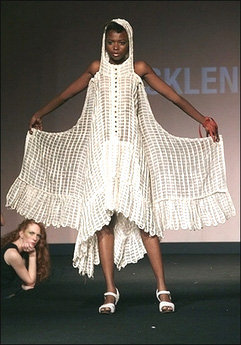AFP
Nov 30, 2007
Fair-trade finds place in rarefied world of luxury goods
AFP
Nov 30, 2007
 Models present creations during the Ethical fashion show, in October 2007 in Paris photo : Marc Wattrelot/AFP |
"People are not buying fair trade to help the planet," said Eric Fouquier, who heads the Thema agency specialised in new "alternative" consumption patterns.
"Luxury items simply have become industrial and are now so common that consumers are seeking goods that are out of the ordinary."
His view echoed others who discussed the growing appetite of consumers for products that respect global environmental concerns on a panel at Paris Fashion Group, a forum of fashion industry specialists.
Young French entrepreneur Francois Morillon, whose Veja organic sneaker brand made of cotton and rubber from Brazil, is making waves in top boutiques, also reckoned politics was far from being the leading factor in his success story.
"Apart from a small number of activists, people don't buy for social or environmental reasons but because they like the product," he said of his 2003 business that went from nothing to 45,000 sneakers a season, made in collaboration with Brazilian co-ops.
"We set up our brand because we want to favour change," he said, "but it's the exceptional quality of a product, the fact that it's original that sets it apart, that makes it a luxury good."
It was like a Hermes leather bag, he said, where the owner knew exactly how it was made.
But Isabelle Laville, whose consultancy Utopies specialises in fair-trade practices, said consumption patterns had changed over the past 12 to 18 months with social and environmental concerns becoming part and parcel of the luxury sector.
Celebs such as Hollywood's George Clooney and Leonard DiCaprio, or rock star Bono, too had favoured sustainable development by speaking out for ethical causes, she added.
"Customer demand is changing," said Sylvie Benard, the head of environment for the world's biggest luxury conglomerate LVMH. "Our customers today are as demanding about luxury as they are about respecting the environment."
Benard said LVMH, which owns Moet-Hennessy drinks, Louis Vuitton leather goods and a bevy of perfume and fashion brands, had been striving for the past 15 years to bolster its green credentials by reducing waste and carefully sourcing animal hides for its top-end leathers.
Moet et Chandon champagnes had halved water consumption over six years while the flagship Vuitton store on Paris' Champs Elysees now used 60 percent less electricity than others after revamping its lighting system.
The company too aimed to help its partners in emerging nations such as Vietnam or Burkina Faso -- which supply ingredients for perfumes and cosmetics -- to develop viable economic projects, she said.
"We don't communicate about what we're doing," she added. "To be extravagant out front you need to be impeccable out the back."
by Claire Rosemberg
Copyright © 2024 AFP. All rights reserved. All information displayed in this section (dispatches, photographs, logos) are protected by intellectual property rights owned by Agence France-Presse. As a consequence you may not copy, reproduce, modify, transmit, publish, display or in any way commercially exploit any of the contents of this section without the prior written consent of Agence France-Presses.

























